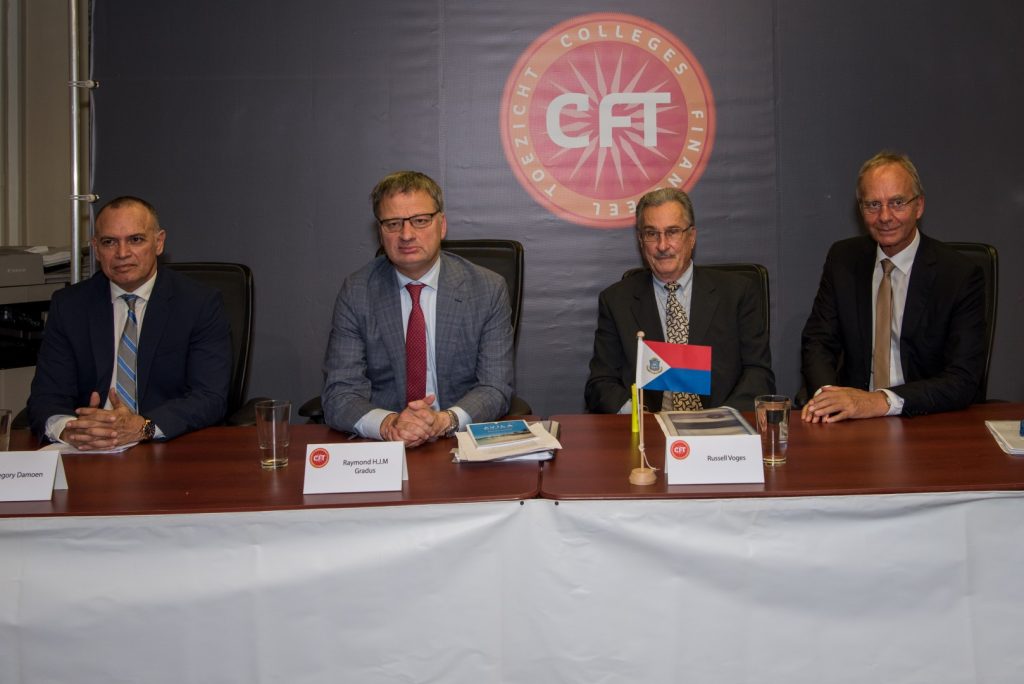CFT board members revolt

PHILIPSBURG – For the first time since its establishment almost ten years ago there is a public row among the board members of the Board financial supervision (Cft). The Cft-members representing St. Maarten (Russell Voges), Curacao (Gregory Damoen) and Aruba (Hellen van der Wal) have openly distanced themselves from an advice to the Kingdom Council of Ministers (KCom) about conditions for the financial support St. Maarten needs to survive the onslaught of the corona-virus crisis.
Voges, Damoen and Van der Wal demand solidarity from stronger economies “with no strings attached” but the advice the Cft sent to The Hague for handling this Friday requires St. Maarten to comply with conditions the KCom set on March 27.
Earlier, in February, the council limited St. Maarten’s liquidity support for 2019 to 50.2 million guilders ($28 million) minus the costs for accommodating inmates in the Netherlands. Up to March 2020 these costs amounted to €3 million ($3.27 million or 5.85 million guilders). That would leave around $24.8 million for liquidity support – just 62 percent of St. Maarten’s regular monthly expenditures.
The KCom also demands that St. Maarten pays an unspecified amount for police assistance and for improvement to the detention situation on the island. The 2019 budget reserved 5.9 million ($3.3 million) for detention-improvements but due to a lack of funding this was not realized, the Cft writes in its advice.
The draft 2020 budget only contains a reservation of 1 million guilders (around $559,000) for the production of a design for a new prison. To assess whether these measures are sufficient, the Cft says that it needs to see the approved 2020 budget first. The parliament has to approve the budget before May 1.
Another condition is the salary cut for ministers and members of parliament. The Cft-advice states that the politicians have taken that cut per April 1: they give up their 6 percent representation costs and their 500-guilders monthly car allowance until the end of the year to a maximum of 10 percent of their net salary.
According to the Cft-advice, the government is working on a national decree aimed at structurally withholding pension-premiums from these salaries.
The Cft is of the opinion that St. Maarten complies “sufficiently” with this condition.
From the Cft-advice it appears that St. Maarten had 40 million guilders in liquidity left in March. Of this amount 26.8 million is freely available while the remaining 13.2 million has been earmarked for capital investments and for payment arrears. Without external help, the government expects it will be able to pay only its regular expenses for the month of April.
The revised draft 2020 budget will take into account that the tourism industry has collapsed and that the country is facing higher expenditures for health care and for economic emergency measures.
If the country receives its liquidity support for 2019 as described above it will be able to meet its financial obligations for the months of April and May.
Contrary to the no strings attached-demands from the Caribbean Cft board members, the Cft advises the KCom to extend liquidity support to St. Maarten in the form of a 2-year bullet loan that can later be turned into a sinking bond.
A bullet loan is like a mortgage over which only interest is paid during its term; the principal is due at the end of the 2-year term. A sinking bond is protected against possible default because it is backed by collateral in a sinking fund that can be used for repayment to bondholders.
In the meantime, Cft-chairman Drs. Raymond Gradus says at the end of his advice that St. Maarten must continue to comply with the conditions set forth if the consensus kingdom law financial supervision – unless the KCom grants an exception based on article 25.
The Caribbean Cft-members stated their position in a letter to Cft-chairman Gradus, the governments of Aruba, Curacao and St. Maarten and the Kingdom Council of Ministers.
They note that financial support in the form of loans will push the GDP to debt ratio over the maximum level of 40 percent. All support that would cause the countries to exceed this level should be gifts.
Voges, Damoen and Van der Wal say in their letter that the Cft-advice is not well-thought-out. The advice does not, or hardly, include our comments and advice and it does not represent the sentiments of the Caribbean Cft-members.”
Furthermore, the advice “insufficiently acknowledges the seriousness of the situation in the Caribbean countries; it takes a one-sided view on the financial aspects and ignores social and economic consequences.” Lastly, the letter states, the advice ignored the Kingdom Charter’s solidarity-principle. Therefore, the Caribbean Cft-members distance themselves from the Cft-advice.


























